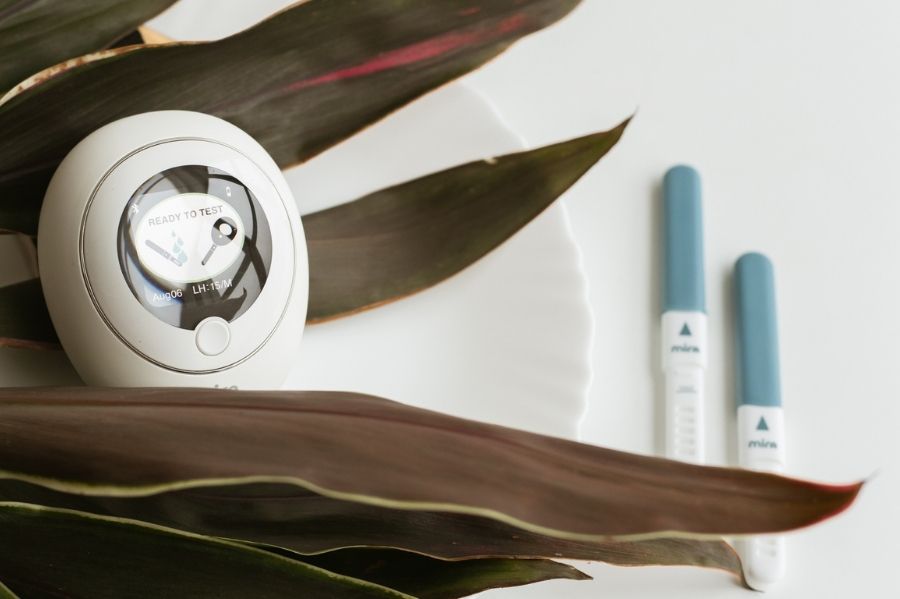If you are struggling with your fertility, you may be tempted to give up hope of ever starting a family naturally.
You probably have experienced taking a pregnancy test. The nerves bubble over as you wait three minutes to see your results. Then, shaking with excitement, you look down to see…
Another negative test result. What gives?
However, there are many natural solutions for increasing fertility that don’t involve medications or needle pricks the way that IVF does.
Whether you’ve just started trying or are struggling with infertility, you can take these steps to boost your fertility and optimize your reproductive health.
Read on to discover our top ten tips for increasing your fertility naturally.

Written by Guest Blogger: Sylvia Kang, the co-founder and CEO of Mira (www.miracare.com)
1. Track your cycles.
The number one way you can boost your fertility and get pregnant faster naturally is to get to know the unique rhythm of your menstrual cycle. Most of us were raised believing that a 28-day cycle, with ovulation on day 14, is the norm. In reality, a normal menstrual cycle can range from 21 to 35 days, meaning that every woman’s fertile window is different.
Ovulation predictor kits (OPKs) can give you some idea of when you’re ovulating, but if you have irregular cycles or high baseline hormone levels, they may not be the most accurate way to predict your fertile window. The most accurate way to track your menstrual cycle is to measure your actual fertility hormone concentrations with the Mira Fertility Tracker.

Mira uses a urine test wand, similar to a pregnancy test, to detect hormone levels in your urine. When the test wand is inserted into the Mira Fertility Analyzer, your hormone levels sync up with the Mira App, which shows you a personalized graph of your unique hormone patterns to let you know when you are most fertile.
Combined with hormone tracking, getting to know the physical signs of fertility — such as changes in your cervical position or cervical mucus — can help you recognize the symptoms of ovulation before you even check your Mira App. Learn how you can check your cervix for cyclical changes at home here.
2. Eat a balanced diet.
Ovulatory infertility, or being unable to conceive due to irregular or absent ovulation, is the leading cause of infertility. It’s responsible for 30 percent of infertility cases — and of these, about half can be attributed to poor diet and lifestyle choices.
Even if you’re ovulating regularly (which you can find out using Mira’s digital fertility tracker), improving your diet may boost your odds of getting pregnant. One popular approach to eating for optimal fertility is The Fertility Diet, a set of principles derived from the first-ever comprehensive study of fertility and diet.
The Fertility Diet is a healthy, balanced approach to eating that works for everyone — even if you are not trying to conceive! In fact, U.S. News & World Report ranked it the #12 best diet overall. So, if you need help sticking to The Fertility Diet, why not get your partner or friends in on it too?

The Fertility Diet boils down to four simple steps to healthier eating:
- Worry less about how many carbs you’re eating, and instead focus on eating unprocessed whole grains that are high in fiber and digested slowly.
- Avoid trans fats, which tend to be hidden in deep-fried foods, baked goods, and margarine, at all costs. Instead, opt for heart-healthy unsaturated fats like olive oil, avocado oil, and flaxseed.
- Load up on plant-based sources of protein like tofu, lentils, and beans. Women who eat more animal-based protein are at a higher risk of infertility, while those who eat more plant-based protein are at a lower risk.
- Choose high-fat dairy products over low-fat dairy products. Yes, this means you can enjoy cheese and ice cream while trying to get pregnant!
Try implementing some of these small, manageable changes into your diet to improve your odds of getting pregnant naturally.
3. Get busy more often.
Got irregular periods? Having irregular cycles can make it more difficult to predict your fertile window, and therefore when you should have sexual intercourse in order to get pregnant.
If you have irregular periods, you may find it less stressful to increase the frequency at which you have sex throughout your menstrual cycle. That way, if you miscalculate your fertility window, chances are that you will still be having enough sexual intercourse to get pregnant. Some sources recommend having sex every two to three days throughout the menstrual cycle for the best odds of getting pregnant.
Even if you don’t have irregular periods, anyone can increase their odds of conception by having more sex throughout their fertile window. An egg only survives for a maximum of 24 hours after ovulation. However, sperm can survive in the female reproductive tract for several days. This means that having more sex leading up ovulation can boost your odds of getting pregnant.
Using the Mira Fertility Tracker can help you pinpoint exactly when you can expect to ovulate — and when you should start having sex for the best chances of conception.
4. Check out fertility yoga.
Did you know that practicing yoga can help you get pregnant? Fertility yoga is a specialized type of yoga class designed especially for women struggling with infertility. It focuses on the second chakra: this area of the body, located just below the navel, is considered vital to fertility in the practice of yoga.

Performing moderate physical activity can make you twice as likely to get pregnant as someone who does not exercise. Yoga is a great option for women who are trying to conceive because it is gentle and incorporates both mind and body. In fact, a study at Massachusetts General Hospital found that 55 percent of infertility patients were able to get pregnant after a 10-week course in yoga and meditation.
In addition to being great exercise for the body, yoga has the added benefit of reducing stress and anxiety. Doing fertility yoga can help you release the need for control during the process of trying to conceive. Many women who practice fertility yoga report that letting go of the need for control helped them get pregnant after years of struggle.
If you’re ready to take on the practice of yoga to boost your fertility, try following these yoga poses for fertility at home.
5. Cut out alcohol and cigarettes.
Drugs can negatively impact our overall health — and that includes our reproductive health. You know that you shouldn’t smoke or drink while pregnant, but as it turns out, letting go of these vices before pregnancy can actually improve your fertility.
Heavy drinking before pregnancy is linked to irregular cycles and infertility. Experts recommend that you stop drinking as soon as you begin trying to conceive. Drinking alcohol can mean that it takes longer for you to become pregnant — and drinking while trying to get pregnant can still impact the health of your future baby.
If you smoke cigarettes, one of the most important things you can do for your overall health is to quit smoking. However, quitting smoking becomes even more important when you are trying to conceive. Smoking ages the ovaries and decreases the supply of eggs. It also harms the reproductive organs and increases your risk of ectopic pregnancy and miscarriage.
And, speaking of drugs, you might also be wondering about how caffeine consumption can impact your fertility. While caffeine is in no way as harmful as alcohol or cigarettes, excess caffeine consumption can negatively impact your fertility. It is safest to drink no more than 200 mg of caffeine per day — the equivalent of two eight-ounce cups of coffee — when trying to conceive.
6. Don’t skimp on sleep.
In case you needed another reason to schedule in that daily nap, know that a good night’s sleep is essential for fertility. Sleep plays an important role in keeping our hormones in balance, including the sex hormones responsible for maintaining fertility.

One of the most important hormones involved in sleep is the stress hormone, cortisol. Lack of sleep increases the levels of cortisol in our body. Stress decreases the amount of luteinizing hormone (LH) and follicle-stimulating hormone (FSH) in our bodies. These hormones control ovulation and fertility — meaning that a consistent lack of sleep may cause ovulatory infertility.
Adult women need at least seven hours of sleep per night (and at least 20 minutes more sleep per night than our male counterparts). Establishing a regular bedtime and waking time can help you ensure you’re getting enough sleep to stay healthy and fertile.
Even so, it’s common for women to experience difficulty falling or staying asleep. As many as 7 in 10 women say that their menstrual cycle impacts their sleep, especially during premenstrual syndrome (PMS). Common psychological issues like stress, depression, and anxiety can also get in the way of a good night’s sleep.
You can combat sleeping difficulties by reducing your intake of salt, sugar, and caffeine during PMS and menstruation, or anytime you are experiencing difficulty sleeping. Gentle breathing exercises can also help you get to sleep faster, especially if stress or anxiety is what’s keeping you awake at night.
7. Maintain a healthy weight.
Maintaining a healthy BMI through good diet choices and regular exercise can help you stay fertile. Ovulatory infertility — the most common cause of infertility in women — often owes to having an abnormal BMI.
Women who are classified as overweight by the BMI system have a higher risk of ovulatory infertility. As many as 1 in 4 cases of ovulatory infertility may be due to overweight. But while society puts a lot of pressure on women to be thin, being underweight is just as bad as being overweight when it comes to maintaining your reproductive health. It’s estimated that 12 percent of ovulatory infertility cases are due to being underweight.
Severe underweight, often seen in women with anorexia nervosa, can even cause a condition called hypothalamic amenorrhea. While it usually goes away after a woman gains weight, hypothalamic amenorrhea means that you do not ovulate or get a period, and are therefore infertile. If you have an active eating disorder, it’s recommended that you complete treatment (including weight restoration) before trying to get pregnant.
Maintaining a healthy diet and exercising regularly often helps correct ovulatory infertility, but there are many external factors that can affect your weight besides diet and exercise. If you are underweight or overweight due to a medical condition or medication and want to become pregnant, speak to your doctor. They can help you determine what the best course of action is for you.
8. Manage stress and anxiety.
Stress and anxiety can negatively impact your fertility in a number of ways. These emotions trigger the release of the stress hormone cortisol — which, as we noted previously, can impact levels of LH and FSH in the body, dysregulating ovulation and fertility.
Stress can cause ovulatory infertility and even hypothalamic amenorrhea. Unfortunately, the challenges caused by infertility often add to our experiences of stress and anxiety. Studies show that the impact of infertility on our emotions is similar to the toll taken by serious illness like cancer and HIV.
Managing your stress and anxiety can help bring your hormone levels back in check, restoring your fertility to normal levels. But as fertility expert Alice Domar writes, simply “relaxing” is not enough to truly manage stress and anxiety. Coping with stress and anxiety requires an active effort on your part.
As we mentioned previously, fertility yoga has been shown to have powerful effects on the stress levels of women struggling with infertility. Studies of women undergoing IVF also suggest that mindfulness meditation is effective at decreasing stress when trying to conceive. You can even try a fertility meditation like this one from our partners at Circle & Bloom to help you relax.
Sometimes, infertility takes a more severe toll on our mental health. If you find yourself experiencing more than occasional stress or anxiety, or noticing symptoms of depression, on your fertility journey, we encourage you to talk to a professional about what you are feeling. There is no shame in reaching out to a doctor or therapist for help.
9. Try fertility supplements.
Supplements aren’t a substitute for medical treatment for infertility, but they may help you conceive faster. If you’re trying to conceive, you should already be taking a prenatal vitamin that contains many essential micronutrients — yet it may also be worth trying these fertility supplements that aren’t found in your average multivitamin.
Coenzyme Q10 (CoQ10) is one of these supplements, which shows remarkable promise in boosting fertility. One study of women with reduced ovarian reserve or poor ovarian response and a poor prognosis found that pre-treatment with CoQ10 improved the outcomes of their IVF cycles.
Another popular fertility supplement is Vitex or chasteberry. This herbal treatment can be used to treat infertility, especially when it is caused by a luteal phase defect. As long as you are not suffering from high prolactin levels, chasteberry may have a positive impact on your fertility.
Many of these fertility treatments have limited evidence, but they also do not appear to cause any harm. Therefore, it’s worth giving them a shot to see if they help you conceive faster, especially if you are struggling with infertility.
10. Rule out underlying health conditions.
Lifestyle changes like the ones above can be incredibly helpful for conception — yet if you struggle with an underlying health condition that causes infertility, you might not see much of a difference from lifestyle changes alone.
Untreated reproductive health conditions like polycystic ovarian syndrome (PCOS) and endometriosis can cause infertility. However, when these conditions are treated appropriately, with medications or even surgery, many women are still able to get pregnant naturally or with the help of fertility medicine.
That’s why it’s essential to visit your doctor to rule out any underlying health conditions, and to ensure that you are receiving the best care possible for any medical problems you might have. If it takes you longer than one year (or six months if you are over age 35) to conceive, talk to a doctor to ensure there is no underlying medical problem standing in the way of your fertility.
Want more tips to help you get pregnant naturally? Download Mira’s free e-book, The Ultimate Guide to Fertility, to learn more!
Guest blogger,
Sylvia Kang
Sylvia Kang, the co-founder and CEO of Mira (www.miracare.com). Mira is the first FDA and CE registered comprehensive women’s health monitoring platform with 99% of accuracy in clinical trials. Mira allows users to see the numeric fertility hormone concentrations and uses AI learning to provide personalized insights based on this quantitative data.
The Mira Fertility Analyzer and App take the guesswork and stress out of ovulation tracking. Mira tracks cycles, predicts ovulation at home, with expandability into monitoring fetal health, measuring ovarian reserve, and detecting menopause chronic disease using the hospital-leveled technology within a palm-sized device. The data automatically syncs with the Mira app. The AI learns personal health patterns.
Order Mira Starter Kit or Mira Plus starter Kit online on https://www.miracare.com/ with promo code COACHKELA and get $25 off.
Join Mira’s Love Season Giveaway: https://www.miracare.com/giveaway-valentines-day/
Register to their FREE Webinar on How to Increase Your Sex Drive While Trying to Conceive: https://my.demio.com/ref/6IouFxEpiLXiCrF0
P.S. Catch this week’s episode of The Hormone P.U.Z.Z.L.E Podcast – Mira Fertility and Our Hormones With Sylvia Kang of Mira Fertility
You can also find my podcast on my podcast page as well as Spotify, and Stitcher.
Don’t forget to subscribe, follow, and write us a review on Apple Podcast (if you LOVE it).



